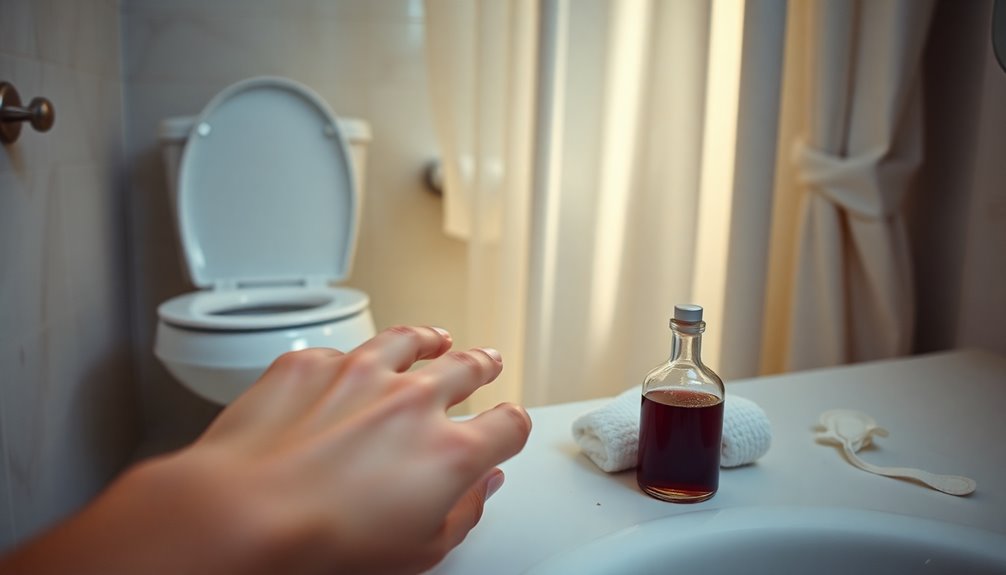Yes, sex can cause urinary tract infections (UTIs), especially in women. The shorter urethra makes it easier for bacteria to enter. During intercourse, bacteria from the anal area can be pushed toward the urethra, increasing the risk of infection. You might notice symptoms like burning during urination or an increased need to urinate soon after. Certain contraceptives and having sex with new partners can also raise your risk. To reduce your chances of getting a UTI, it is crucial to practice proper hygiene and follow some preventive measures. There's more to discover about how to safeguard your health effectively.
Key Takeaways
- Sexual activity can increase the risk of UTIs, especially in women due to their shorter urethra.
- Bacteria from the anal area may be transferred to the urethra during intercourse, leading to infections.
- Certain contraceptives, like diaphragms and spermicides, can disrupt vaginal flora and heighten UTI susceptibility.
- Symptoms of a UTI after sex may include burning during urination, increased urgency, and pelvic pain.
- Preventive measures include urinating before and after sex, maintaining hygiene, and staying hydrated.
Overview of UTIs and Sexual Activity

When you engage in sexual activity, the risk of developing a urinary tract infection (UTI) can increase considerably. This risk is particularly high for women, who are more prone to getting UTIs due to their shorter urethra.
During intercourse, thrusting can push bacteria from the anal area into the urethra, elevating infection chances. Certain contraceptives, like diaphragms and spermicides, can also disrupt vaginal flora, creating an environment where bacteria thrive.
Frequent sexual activity, especially with new partners, introduces various bacterial strains that heighten susceptibility to urinary tract infections.
To prevent UTIs, it's crucial to be aware of these risk factors and take steps to minimize exposure, especially if you've experienced recurrent UTIs in the past.
Symptoms of UTIs After Sex

Have you ever noticed discomfort after sexual activity? Many women experience symptoms of a UTI shortly after intercourse due to anatomical factors.
Common signs include a burning sensation during urination, increased urgency, and painful urination, often appearing within a couple of days. You might also notice pelvic pain or cloudy, foul-smelling urine, which can indicate an infection.
If left untreated, UTIs can escalate into severe infections, leading to fever, chills, nausea, or vomiting. It's essential to recognize these symptoms early to avoid complications.
Risk Factors for UTIs

Experiencing discomfort after sex can be a strong indicator of a urinary tract infection, and understanding the risk factors associated with UTIs can help you take preventive measures. Here are some key risk factors to take into account:
| Risk Factor | Description |
|---|---|
| Shorter Urethra | Women have a shorter urethra, allowing bacteria easier access. |
| New Sexual Partner | Introducing different bacteria can lead to "honeymoon cystitis." |
| Anal Sex | This can facilitate bacteria transfer to the urethra. |
| Hormonal Changes | Menopause disrupts vaginal flora, increasing UTI susceptibility. |
Additionally, certain contraceptive methods like diaphragms can disrupt normal vaginal bacteria, heightening the risk of UTIs. Being aware of these factors can help you make informed choices.
Prevention Strategies for UTIs

To effectively prevent urinary tract infections (UTIs), it's vital to adopt several proactive strategies that minimize the introduction of bacteria.
Start by urinating before and after sexual intercourse, as this helps flush bacteria that may have entered during intimate moments.
Maintaining proper hygiene is important; wash with mild soap and water before sex and always wipe front to back after using the restroom.
Staying hydrated by drinking 6-8 glasses of water daily dilutes urine, promoting frequent urination to flush bacteria.
Additionally, using water-based lubricants reduces friction and irritation, lowering the chances of introducing bacteria into the urethra.
Finally, steer clear of irritants like douches and scented products to keep your vaginal environment healthy and further prevent UTIs.
Treatment Options for UTIs

When a urinary tract infection (UTI) strikes, effective treatment is essential to alleviate discomfort and eliminate the infection. Typically, healthcare providers prescribe antibiotics for UTIs, with courses lasting three to seven days depending on the infection's severity.
For immediate pain relief, over-the-counter options like phenazopyridine can help with burning during urination, though they don't treat the bacterial infection itself.
If you experience recurring UTIs, your provider may suggest preventive antibiotics after sexual activity or as a long-term low-dose treatment.
To guarantee successful treatment, urine cultures may be performed to identify the specific bacteria and tailor your antibiotic treatment.
Remember to complete your full course of antibiotics to prevent the infection from returning and to avoid antibiotic resistance.
Frequently Asked Questions
How Can I Prevent UTI From Sex?
To prevent a UTI from sex, start by urinating before and after intercourse to flush out bacteria.
Keep your genital area clean by washing with mild soap and water beforehand.
Opt for water-based lubricants to reduce friction and irritation.
Avoid spermicides and diaphragms, as they can disrupt vaginal flora.
Finally, stay hydrated; drinking plenty of water helps increase urination, which further aids in flushing out any potential bacteria.
Why Do I Get a UTI After Sex?
You might get a UTI after sex because bacteria can easily enter your urethra during intercourse, especially if you're engaging with a new partner.
Friction can irritate the area, making it easier for germs to invade. If you've had anal sex, bacteria from that area can also contribute to the issue.
To help prevent this, remember to urinate before and after sex to flush out any harmful bacteria.
What Sex Position Causes UTI?
Certain sex positions can increase the risk of UTIs.
Deep penetration positions, like doggy style or missionary, might push bacteria closer to your urethra. If you're noticing discomfort or irritation, those positions could be contributing factors.
Instead, try positions that allow for shallower penetration to minimize the risk.
Why Do I Keep Getting UTI From My Boyfriend?
If you keep getting UTIs from your boyfriend, it could be due to several factors.
You might be experiencing bacterial transfer during intercourse, particularly if hygiene isn't prioritized. You might also be affected by his sexual practices, especially if he's a new partner.
To combat this, you should urinate before and after sex, maintain cleanliness, and discuss any hygiene concerns with him.
Taking these steps can help reduce your risk considerably.
Conclusion
To sum up, sexual activity can indeed increase your risk of urinary tract infections (UTIs). It's worth mentioning that nearly 80% of women will experience at least one UTI in their lifetime, often linked to sexual intercourse. To protect yourself, remember to stay hydrated, urinate before and after sex, and maintain good hygiene. By taking these steps, you can enjoy a healthier and more comfortable intimate experience while minimizing your risk of UTIs.










